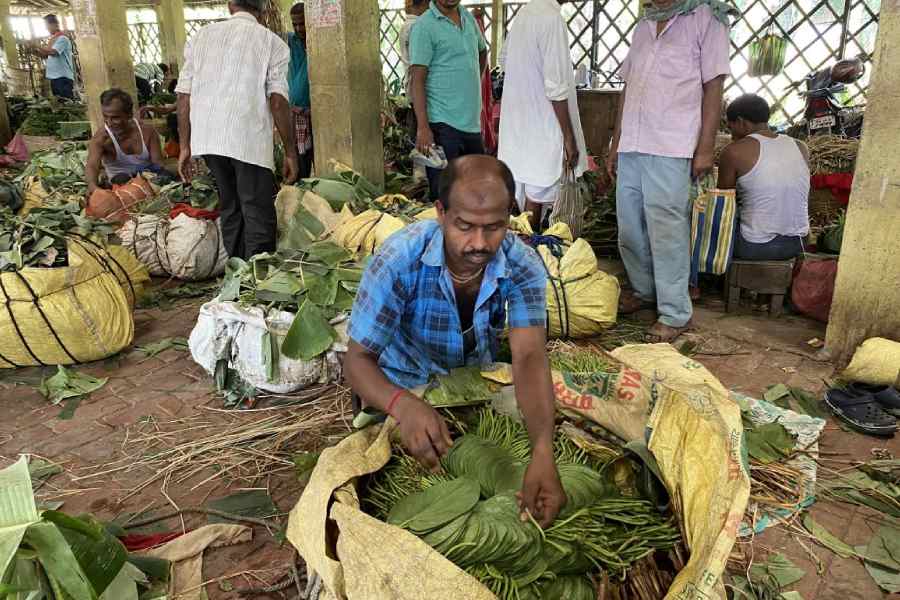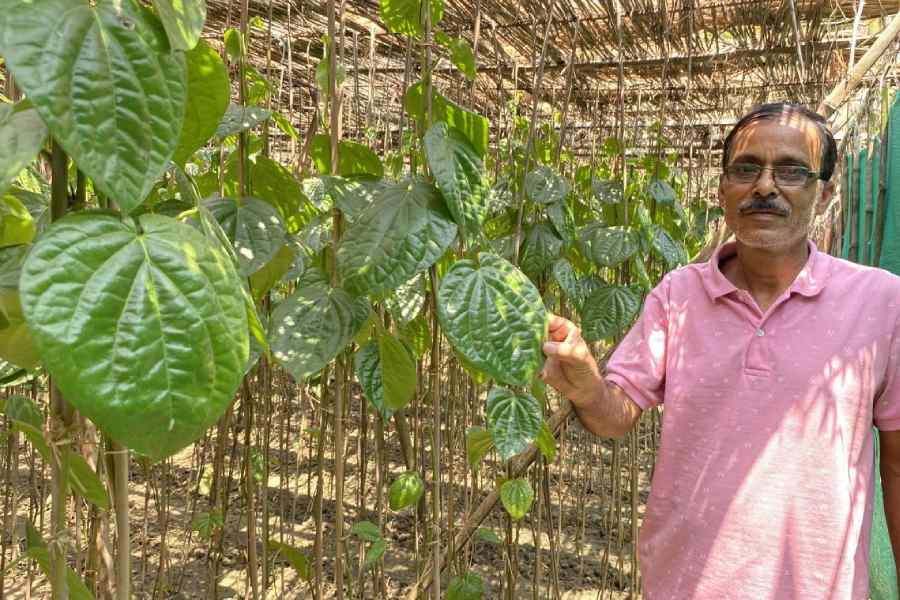Kanailal Achar, 52, a betel leaf farmer, has never visited Dubai. Nor does he have any relatives or friends in the United Arab Emirates.
It was beyond his imagination that he would have to face the brunt of the recent floods in Dubai, 3,330km from his home in Teghari village, East Midnapore.
In mid-April, the UAE received its highest rainfall in 75 years, with the flooding mainly affecting Dubai, Sharjah and the northern emirates. The Dubai International Airport witnessed 1,244 flight cancellations in just two days.
As exporters mainly use Emirates flights to send their consignments to the UK and European Union countries, betel farmers like Kanailal were left high and dry.
“All of a sudden, on April 18 morning, the person to whom I sell my paan informed me that he would not purchase my produce because of the floods in Dubai,” Kanailal said.
“With the regular buyers not purchasing my produce for the next five days, I had to sell it at less than half the price, suffering a loss of ₹60,000.”
Kanailal used to sell 1,000 betel leaves at ₹1,700 but the Dubai floods forced him to sell at ₹800.
Hundreds of other paan farmers, such as Anup Maity from Kurpai village in Tamluk and Rabindra Jana from Nandakumar, too, suffered because of the Dubai floods. Adding to their woes, the scorching heat has led to a 25 to 30 per cent fall in production, farmers said.
“Emirates flights were cancelled for five days. As we could not have sent our consignments, we did not buy betel leaves from farmers,” said Premjit Adak, an exporter.

The paan market in Ramtarak in East Midnapore. Picture by Snehamoy Chakraborty
Britain and Europe apart, the key foreign consumers of betel leaves from Bengal — especially East Midnapore — include Bangladesh, Saudi Arabia, Thailand, Taiwan, Oman and Kenya.
Kanailal said that thousands of farmers like him would not have faced such losses had the government set up a cold storage.
“We can’t preserve betel leaves for long periods, unlike paddy or potatoes, but we can hold them for a week if we have cold storages,” he said.
“We have to pluck the fully grown leaves within 24 hours. Without a cold storage, we are forced to sell at throwaway prices during a crisis.”
Kanailal said he goes to the Ramtarak Paan market, one of 16 such markets in East Midnapore where thousands of betel leaf farmers auction their produce, three days a week.
East Midnapore is the biggest producer of betel leaves in Bengal. Howrah, South 24-Parganas, Cooch Behar, Alipurduar and parts of Nadia also grow paan.
At a rough estimate, around 20 lakh farmers are involved in betel-leaf cultivation in the state. However, most of them are not registered with the state horticulture department.
“We have started registering the farmers; the process is on,” said a horticulture department official in Calcutta.
The government helps farmers with water sprinklers, green nets for their betel-leaf sheds, and financial aid if the sheds are damaged in heavy rain or cyclones, the official said.
But Rabindra Jana, a 58-year-old betel leaf farmer from Ramchandrapur village in East Midnapore, said the help remains on paper for many.
“The government has plans for us but we don’t get its benefits. In most cases, the political bosses in the area decide who gets compensation for the damage.”
Farmers said the prices of organic fertilisers and bamboo — needed to build the sheds — had skyrocketed over the past 10 years. They said that while the government provided fertiliser subsidies for paddy or wheat, it didn’t for betel leaves.
“Our profits are steadily falling. It’s forcing the younger generation to go to Calcutta or other states to find work, forsaking the traditional family occupation,” a betel leaf farmer said.
In election season, both the Trinamool Congress and the BJP are trying to woo the substantial community of betel leaf farmers in East Midnapore. In Tamluk alone, betel leaf farmers and their families make up around 2.5 lakh of the constituency’s 16 lakh voters.
“The state government did not set up any cold storage for the betel leaf farmers of the area. This is forcing these farmers into distress sale,” Tapasi Mondal, BJP Tamluk organisational district president, said.
“It’s a commitment from us to set up multiple cold-storage facilities for the farmers of the region.”
Trinamool leaders said the state government had taken a slew of measures for the welfare of the betel leaf farmers, and that the Narendra Modi government had failed to recognise betel leaves as an agricultural product despite repeated appeals.
“The Centre is not recognising the betel leaf as an agricultural product, which means the farmers are not getting government benefits like insurance and subsidised fertilisers,” Soumen Mahapatra, Trinamool MLA from Tamluk and a former minister, said.
“We are fighting to get the tag from the Centre. During a disaster, it’s our government that stands by the farmers.”
Tamluk votes on May 25

